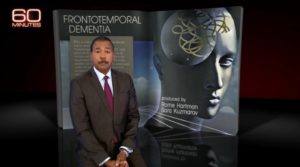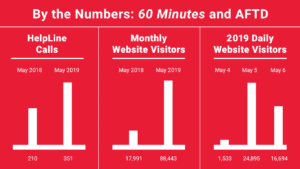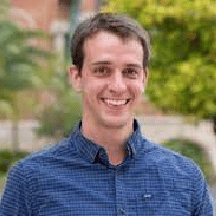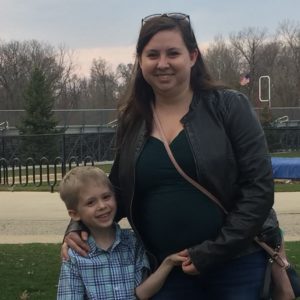
On May 5, the venerable CBS news program 60 Minutes aired a segment on FTD, bringing newfound awareness to a television audience of millions.
Entitled “The Cruelest Disease You’ve Never Heard Of,” the 14-minute segment introduced viewers to the symptoms of FTD and profiled several people whose lives have been touched by the disease.

Reporter Bill Whitaker presents a story on FTD, which aired on 60 Minutes on May 5
Rome Hartman, lead producer of the segment, said that he was compelled to tell the story of FTD “partly because of how little known it is, and partly how devastating the symptoms are – and how difficult it is to diagnose.”
AFTD provided the show’s producers with background information on FTD and connected them with Bruce Miller, MD. Dr. Miller, who leads a robust FTD program at the University of California San Francisco and is a founding member of AFTD’s Medical Advisory Council, was the medical expert featured in the piece.
AFTD also connected producers with the Very Rev. Tracey Lind, who was diagnosed with primary progressive aphasia in 2016, and Amy Johnson, a mother of four young children whose husband has behavioral variant FTD, both of whom were also profiled in the story.
“I wish the illness didn’t exist,” Hartman said. “But given that it does, I’m grateful for the chance to have met these people and shared their stories with our audience.”
Upon airing, the story had an immediate and measurable impact on FTD awareness – a testament to the importance of sharing FTD stories. AFTD’s website had its highest-traffic day ever on May 5; May 6 was not far behind. All told, nearly 89,000 users accessed theaftd.org in May 2019, nearly five times the number of users from the previous May. (See charts on page 8.)
Inquiries to AFTD’s HelpLine also rose following the broadcast. AFTD staff provided practical, compassionate and medically accurate information in response to 351 HelpLine calls and emails in May 2019, up from 210 HelpLine cases in May 2018.
The full 60 Minutes piece is available to view via CBS All Access, a subscription-based service. A 60 Minutes Overtime segment, which features Hartman and reporter Bill Whitaker, provides a behind-the-scenes look at the making of the piece, and is available to watch on YouTube, along with a May 6 CBS This Morning interview with Dr. Ted Huey of Columbia University and AFTD’s Medical Advisory Council. Visit tinyurl.com/AFTD60Mins for more information

Held on May 3 in Los Angeles, AFTD’s 2019 Annual Education Conference provided the latest developments in FTD science and offered practical information about the realities of living with the disease.
More than 330 people were in attendance, including 38 registrants who identified as having FTD. Notably, an additional 300 additional people followed along with the conference live online. For the first time, AFTD ensured that the conference would be professionally broadcast to members of our community throughout the country and the world.
“AFTD’s Annual Education Conference is a rich resource for knowledge and connecting with others – and we understand that for many people facing FTD, traveling to the conference in a given year may not be an option,” said AFTD Senior Director of Programs Sharon Denny. “Livestreaming provided an easy way to ensure that everyone who wants to ‘attend’ the conference can do so.”
During the morning plenary session, a mix of persons diagnosed, care partners, medical professionals and others participated in panel discussions on the topics “Advances in Understanding FTD,” “Perspectives on Research,” and “Perspectives on Care and Support.”
Later, AFTD CEO Susan L-J Dickinson shared highlights from the ambitious Strategic Plan that was approved by the AFTD Board in December, and will guide our work over the next three years.
Actor, producer and FTD care partner Martha Madison delivered the conference’s keynote address. Madison, best known for her role as Belle Black on Days of Our Lives, shared candidly how she and her family have found help and shared hope since her mother Barbara was diagnosed with behavioral variant FTD in 2008, at age 56.
Following an informative and engaging round of afternoon breakout sessions focused on clinical issues, care strategies and networking, attendees reconvened to share Lifelines – anything large or small that helps sustain them on their FTD journey.
Video or audio recordings of every conference session are archived at AFTD’s website: Visit www.theaftd.org/2019aftd-education-conferencematerials to learn more. And see below for information about the conference’s generous sponsors.
It’s not too early to begin planning to attend AFTD’s 2020 Education Conference, to be held in Baltimore, Maryland, on Friday, April 17, 2020! Stay tuned to theaftd.org for more information.


Kimberly Pang Torres
Jackie Pang was diagnosed with FTD in 2017, less than a year after her daughter, Kimberly Pang Torres, first noticed changes in her behavior. The diagnosis understandably rattled the family: “We knew this was not going to be a good prognosis for Mom,” said Kimberly, who joined AFTD’s Board in May 2019. “We know how this is going to end.”
But Jackie’s FTD spurred the family into action, not resignation. “You can focus way too much energy on being sad,” Kimberly said. “I had many rough moments of tears, sadness, and anger, and still do. But as a family, we made a choice that we would focus our energy on the things we can control instead of the things we cannot change. If we can share our experiences to help other families through their journey -- that is what we are going to do.”
Like most people, she had never heard of FTD until it directly affected her life. “I’m so thankful that I stumbled upon AFTD’s website,” she said, “because that was the best source of information about FTD – and it was presented simply, so that we could understand it.”
The Pang family has since been heavily involved in fundraising to support AFTD’s mission. Kimberly recalled her reaction to her father, Joe Pang, telling her he was going to participate in an 8K – “My dad is definitely not a runner, so for him to say he’s participating in an 8K, I knew he was serious and that I had to participate too!’” Joe was determined to finish the race, saying he would crawl to the finish line if necessary.
Joe and the rest of the Pang family came out in full force to the Philadelphia Marathon in 2017 and 2018 – members of their race team wore matching t-shirts bearing the moniker “Team Jack Attack” in Jackie’s honor. “We did not expect the support we got from family, friends, people we barely even knew,” Kimberly said. Team Jack Attack’s efforts at the two Philadelphia Marathons combined to raise $61,000 to support AFTD’s mission; a separate Food for Thought event raised more than $3,000.
As a new member of AFTD’s Board, Kimberly said, “I’m going to stay passionate about fundraising.” She also hopes to further AFTD’s work toward creating greater public awareness of FTD.
In considering whether to join AFTD’s Board, Kimberly asked herself whether she had time for it – she has a busy full-time job at Johnson & Johnson, and supports a family business. But she quickly realized that “I have to have time to do this,” she said. “I care so much about AFTD and its mission. I know that other people will be able to find hope and community through AFTD. That was the most important thing for me and my family. The sense of not feeling so alone – it makes the journey just a little easier.”
AFTD Adds New Staff
In June, Deena Chisholm became AFTD’s Education Program Manager and will work to provide FTD education to healthcare professionals. She is experienced in developing and implementing health education, tools, programs and interventions that promote engagement as well as optimal health and wellness. In her career Deena has worked to develop and implement several new initiatives and research focused on dementia care, violence prevention, medical health education and health equity. She received her Masters of Public Health from West Chester University. Additionally, Maggie Cavanagh joined AFTD in June as Grassroots Events Coordinator, working with Special Events Manager Bridget Graham. Her work will focus on AFTD’s Food for Thought, With Love, and Race Season campaigns, as well as independent events and Facebook fundraisers. She received a B.S. in mass communication with a focus in advertising from Towson University.
Additions to the AFTD Board
AFTD is pleased to welcome Kimberly Pang Torres to our Board of Directors (see above), and to welcome back Jary Larsen. Jary was an AFTD Board member from 2010-2017, and served as Board chair from 2013-2016.
U.S. News & World Report Article Focuses on FTD
On April 18, U.S. News & World Report brought attention to FTD with a broad overview of the disease, including quotes from AFTD CEO Susan L-J Dickinson. In the article, Dickinson is quoted speaking about FTD’s symptoms and how they differ from those of Alzheimer’s, the difficulties in getting an FTD diagnosis, and the likelihood that current estimates of the number of FTD cases in the U.S. (around 50,000-60,000) represent an undercount.
Taking AFTD’s National Volunteer Program to the Next Level
The AFTD Board and staff recognize the important role the volunteer network plays, and will continue to play, in ensuring AFTD’s overall success in addressing our mission. As a result of the goals set forth in the new Strategic Plan, AFTD will see an increase in volunteer engagement in local communities, working to create a stronger presence through several initiatives. Plans are in the pipeline to support a new volunteer program structure as we prepare for growth. We plan to launch the newly designed volunteer program this fall – stay tuned for more details.
"What a hopeful day...I'm left with the image of so many families who you brought together sitting out on that sunny patio finding conneciton and support in one another..."

An FTD diagnosis can take years to obtain, a process often rife with frustration and a growing sense of isolation. AFTD was founded on the belief that the darkness brought on by this tragic disease deserves a comprehensive response. Today, for families facing an FTD journey, AFTD provides help and a chance to connect with others who understand. AFTD advances a vision of hope.
Your support makes that possible. Your donations drive cutting-edge research, and help us to answer thousands of HelpLine calls each year. Your gifts help us to train support group volunteers, and provide Respite, Travel, and Quality of Life grants to those who can benefit from them. Your support makes it possible to connect and education hundreds at our Annual Education Conference, and spreads awareness of the

challenges brought on by young-onset dementia to a growing audience each year.
As a donor - or as a volunteer supporting this mission - you bring help and hope to all whose lives are impacted by this disease. Together, we can realize a brighter future - one with compassionate care, effective support, and a future free of FTD.
To bring help today and hope for tomorrow, simply visit theaftd.org and click on the Donate+ button at the top of the page.
By supporting talented young investigators during the final stage of their scientific training, AFTD Postdoctoral Fellowships lay the groundwork for tomorrow’s discoveries in FTD research. This year marks the 10th anniversary of the Postdoctoral Fellowship program as well as the first time AFTD has awarded separate fellowships in basic science and clinical research, analogous to our Basic Science and Clinical Research Pilot Grants.
We are grateful for the opportunity to expand this important source of funding for the next generation of FTD scientists, and are proud to announce the recipients of the 2019-2021 Basic Science and Clinical Research Postdoctoral Fellowships:
Ming-Yuan Su, PhD, a postdoctoral fellow in the laboratory of James Hurley at the University of California at Berkeley, received the inaugural Basic Science Postdoctoral Fellowship for her proposal, “A structural approach to rescuing C9orf72 haploinsufficiency in ALS-FTD.”
Dr. Su, who brings to the table an impressive background in structural biology, will utilize an innovative technique known as cryo-electron microscopy to map the three dimensional structure of two intertwined proteins: the protein encoded by the C9orf72 gene — the gene most often affected by an FTD-associated mutation — and SMCR8, a protein accomplice necessary for C9orf72 to function properly. Compounds that stabilize this protein partnership could lead to an effective treatment for FTD.

Oriol Dols Icardo, PhD
Oriol Dols Icardo, PhD, was awarded the first AFTD Clinical Research Fellowship for his proposal, “Identification of an RNA-based biomarker in FTD.” He is a Postdoctoral Researcher at the Institut de Recerca de l’Hospital de la Santa Creu i Sant Pau in Barcelona, where he will complete his postdoctoral training under the supervision of Jordi Clarimón Echavarria.
Dr. Icardo will look for changes in RNA extracted from postmortem brain tissue and ultimately from the cerebrospinal fluid (CSF) of persons diagnosed with FTD. Differences in CSF RNA that distinguish specific FTD subtypes -- or confirm an FTD diagnosis -- could be the basis of a fluid biomarker and identify new targets for RNA-based drugs.
AFTD staff and Board members, along with representatives from the FTD Disorders Registry, attended the Alzheimer’s Disease-Related Dementias Summit, held March 14 and 15 in Bethesda, Maryland. The meeting set the agenda for government-funded research in Alzheimer’s-disease related dementias (ADRD), including FTD, for the next three years.
The National Institute of Neurological Disorders and Stroke (NINDS) hosted and organized the Summit. Key AFTD stakeholders used the opportunity to shine a light on the realities those living with the condition often face, as well as disparities in the knowledge base as compared to other forms of dementia, such as Alzheimer’s disease.
Gail Andersen, chair of AFTD’s Board of Directors, spoke about the difficulties she faced while seeking accurate diagnosis and medical care for her late husband, who had behavioral variant FTD.
“It took seven years for my husband to be diagnosed, while we were raising young children,” Andersen told the assembled researchers. “Our children didn’t get to know the father he could have been. Most importantly, without a diagnosis, he was not treated with the respect he deserved as someone with a terminal illness. So I cannot stress enough how important your work is, and to continue your work for a good clinical diagnosis.”
AFTD Senior Director of Programs Sharon S. Denny and Program Manager Matthew Sharp both urged scientists from NINDS and members of the National Alzheimer’s Project Act (NAPA) Council to include persons with younger-onset dementias in their research agenda.
Denny specifically addressed minimum-age cutoffs in certain studies, highlighting the need to “broaden the conversation around dementia” to mitigate disparities.
“There need to be ways of particularly addressing how to include folks under the age of 65 in the mechanisms we are developing,” Denny said, referring to the programs that will eventually form the National Plan on ADRD research.
Sharp concurred. “We now know that dementia is not an inevitable part of aging, but dementia is still more-or-less considered a disease of the elderly,” he said. “We need to reframe dementia in a way that is scientifically accurate and true to the research, and that engages the younger portion of the population” often diagnosed with conditions like FTD.
Final recommendations from the Summit will be reviewed by the National Advisory Neurological Disorders and Stroke (NANDS) Council in September. Those approved will be forwarded to the NAPA Council for incorporation.
AFTD offers a young-adult Facebook group for people in their 20s and 30s who have a family member or loved one with FTD. This group is “secret,” meaning it cannot be found through a Facebook search, and is administered by a volunteer who is also a young adult with FTD in their life.
Over three years ago, Kati Woodford (NC) agreed to take on the volunteer administrator role for the group. AFTD is forever grateful for her service! We asked Kati about her experience.
Why volunteer in this role?
While I was a full-time student in a masters program, interning and working part-time, AFTD provided me the opportunity to accept a flexible volunteer role that I could complete remotely, while still connecting with a cause close to my heart. I feel honored that AFTD recognized my desire to help while still respecting the other commitments I had in my life. I have immense pride in my experience as an administrator, mostly due to the gratitude I received from my family.
What have you learned from this volunteer position?
I learned the importance of support and having a community to connect with when you are experiencing challenging situations in life. Young adults, particularly, have dwindling access to natural sources of support. I found it extremely empowering to use social media to unite people with a common experience to support one another through the difficulties of FTD.
Kati has now turned the reins over to a new volunteer administrator, Marlene McKian (MI), who is picking up where Kati left off. Marlene raised her hand to administer the young-adult Facebook group because she wanted to give back and help connect others who, like her, have FTD in their lives. Both her mom and uncle had bvFTD.

Marlene McKian with her son, Ezra
Marlene wants to help make the journey less isolating for those going through it now. AFTD welcomes Marlene!
AFTD Online Community Coordinator Lauren Gauthier shared, “Our Facebook-based support groups are an integral aspect of the support system that we offer to our community. Because of the unique challenges faced by young adults with an FTD diagnosis in their family, having a safe place to talk through those challenges with others who understand is essential. Kati’s contributions to the group greatly enriched the experience for others, and we are extremely grateful for her years of service. As Kati steps out of her volunteer position, I’m excited for the opportunity to work with Marlene, and to see what unique gifts and perspectives she brings to the role.”
To learn more about the young-adult Facebook group and the steps necessary to join, visit the Support for Care Partners section of AFTD’s website.
On May 2 in Los Angeles, AFTD hosted its first Volunteer Appreciation Dinner. AFTD CEO Susan Dickinson and Volunteer Manager Kerri Keane joined several other AFTD staff members to recognize and thank all of the volunteers who helped to make a difference this past year in our shared mission to find help and share hope.
With more than 60 volunteers in attendance, the dinner gave our volunteer community the opportunity to meet and connect with fellow volunteers, to spend time with staff, and to simply enjoy a fun evening.
The event included a presentation by Kerri, in which she highlighted some volunteer accomplishments from the past year, including:
- 62% of the volunteers at dinner had participated in at least two types of volunteer activities, providing valuable and varied contributions toward our mission.
- In the past year, 36 volunteers represented AFTD at 47 table settings, reaching more than 18,000 people (a 260% increase from last year!). Table settings let volunteers represent AFTD at community events and conferences, introducing FTD and sharing AFTD information with various audiences, many of whom are learning about FTD for the first time.
- AFTD Meet & Greets reached over 140 people. Meet & Greets are opportunities for volunteers to plan and facilitate informal gatherings to bring together people whose lives have been touched by FTD.
- 101 support group volunteers created a supportive space for hundreds of care partners monthly.
- Last year was the most successful to date for our Grassroots Events Program, with volunteers raising over $640,000!
- The number of volunteers who went through our orientation more than doubled, from 27 to 59
Race Season
The AFTD-Team Race Season had an early start this year after expanding from a seasonal to year-round campaign! Two great races are already in the books: The Austin Marathon (TX) and the Colfax Marathon (Denver, CO). Combining numbers from those two races, we’ve already had 106 people run on the AFTD-Team, raising more than $12,800 towards AFTD’s mission.
In addition to going the distance, some AFTD-Team members took their participation beyond the finish line by raising funds for AFTD.
Reaching New Heights:
Jeff Hunter from California climbed Denali—the tallest mountain in North America—on a three week-long mountaineering expedition in honor of his father, who passed away from FTD in 2017. Leaving on the two-year anniversary of his father’s passing, Jeff eventually reached a personal altitude record of 17,300 feet. As if his climb wasn’t impressive enough, Jeff also fundraised over $32,000 to help advance research through AFTD.
Quest for the Cure:
The Robert M. Hatfield Foundation in Florida hosted the eighth annual Quest for the Cure Golf Tournament at the Bardmoor Golf & Tennis Club. Pam Hatfield and her son, AFTD Board member Matt Hatfield, founded the organization in memory of Pam’s husband and Matt’s father, Robert, who passed away from FTD in 2010. This year’s event raised $7,900, increasing their total tournament giving history to $57,900 donated to AFTD.
Jam Master Day:
Chris Costello of Massachusetts hosted an event at the Cambridge Boat House in honor of his brother Ed, who was diagnosed with FTD two years ago. The event, called “Ed’s Jam Master Session”, featured live music, food and drinks—a great combination that helped to raise $6,163 for AFTD.
Fund-Riesling:
Allyson Schrier of Washington hosted a Celebration of Life for her husband, Evan, who passed away from FTD in February. Allyson had wine bottles labeled with his picture as a “thank you” for attendees who donated to AFTD. Over 100 people attended and six cases of wine were taken home, totaling $3,585 donated to AFTD in Evan’s memory.
Casual for a Cause:
Catelyn Griffith of North Carolina hosted a dress-down day at her school in honor of her father, who has FTD. She gave an informational speech to her classmates about FTD and her family’s journey with the disease. She raised $2,554 for AFTD—a successful fundraiser at any age, but especially impressive for an eighth grader.
Half Marathon, Full Hearts:
Melissa SantaCroce of New York and her two best friends, Meredith Corvo and Jennifer Lesnick, ran the Fairfield, CT Half Marathon in honor of her father, who was diagnosed with PPA in 2016. They also teamed up to raise a total of $2,853 for AFTD.
Raising the Bar(s):
Greg Dickinson of New York hosted a charity bar crawl in the East Village to benefit AFTD. Participants contributed $50 to take part in the crawl, which included drink specials at three popular bars. The event raised a total of $2,000 donated to AFTD.
Denim Momentum:
Gerda Spears of Colorado held a jeans day at her office, RBC Wealth Management. Everyone was casual and comfortable, and helped raise $1,442 for AFTD.
Chattanooga Can-Do:
David Biddle of Ohio participated in the IRONMAN 70.3 Chattanooga in May in honor of his wife, who was diagnosed with bvFTD in 2016. His eldest grandson, Levi, raced alongside him. In the lead-up to the big day, David raised $1,234 for AFTD.
In Memoriam:
Doug Ekstrand of Colorado hosted a fundraising page in memory of his wife, Jeannette, who passed away from FTD/ ALS this April. She was the mother of Danielle, Charlie and Haley; and identical twin sister of Cathy Pfeifer, who also passed away from FTD/ALS in 2016. (Cathy was the wife of AFTD Board member David Pfeifer.) The page raised $1,155.
